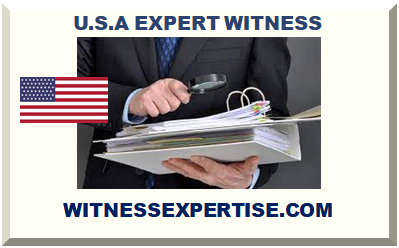
USA EXPERT WITNESS 2024
UNITED-STATES WITNESS EXPERTISE USA EXPERT WITNESS 2024 US EXPERT WITNESSES TESTIMONY AMERICAN CLAIM ADJUSTER
In the USA, an expert witness in 2024 is a person with specialized knowledge, skill, experience, training, or education that extends beyond that of an average person, qualifying them to provide a court or jury with an informed opinion on a particular subject relevant to a legal case.
In the USA, the expert witness primary role is to provide independent expertise to the court on complex subjects, thereby aiding the judge or jury in understanding technical aspects of evidence and issues that are outside the general knowledge of non-experts.
US expert witnesses are distinguished from lay witnesses in that they are allowed to offer opinions in court, whereas lay witnesses may only testify about facts they have directly observed or experienced.
In the United-States, in preparing for their role, expert witnesses may review case materials, conduct independent analyses, and develop specialized reports that synthesize their findings in the context of the case at hand.
In the USA, the expert witness, during a trial, may be called upon to testify, where they explain their methodologies, present their findings, and provide their professional opinion, often while being subjected to cross-examination by the opposing legal counsel.
US expert witnesses in the USA in 2024, beyond trial testimony, also play a crucial role in pre-trial preparations, such as depositions, and may be involved in settlement negotiations by providing clarity on technical issues that can influence the outcome of the case.
ALL ABOUT US EXPERT WITNESS
Questions and Answers (FAQ) about US expert witnesses
1. What qualifies someone to be an expert witness in the US?
An individual is qualified as an expert witness in the US based on their specialized knowledge, skills, experience, training, or education which is pertinent to the case at hand, enabling them to provide authoritative insight or opinion in court.
Qualifications can vary, but typically include advanced degrees in their field, certifications, professional experience, publications, and previous expert testimony experience.
2. What is the primary role of an expert witness in the US legal system?
The primary role is to provide independent and objective expertise to the court, aiding judges and juries in understanding complex technical or scientific aspects of a case beyond common knowledge.
They analyze, interpret, and present information in their area of expertise, offering opinions to help the court reach a more informed decision.
3. How does an expert witness differ from a standard witness in a US court?
An expert witness provides specialized knowledge or opinions based on their expertise, while a standard witness can only testify about facts they have directly observed or experienced.
Expert witnesses are permitted to express opinions and interpret data, a privilege not typically granted to lay witnesses.
4. Can an expert witness in the US be involved in more than one aspect of a legal case?
Yes, expert witnesses may be involved in various stages of a legal case, including case review, pre-trial preparations, depositions, and trial testimony.
They can also contribute to settlement negotiations by providing technical clarity on issues at hand.
5. What is the process of selecting an expert witness in the US?
Selection involves identifying experts with relevant qualifications and experience, often through specialized directories, legal referrals, or professional organizations.
Attorneys typically review the expert's credentials, prior testimony, publications, and potential conflicts of interest before selection.
6. Are there ethical guidelines that US expert witnesses must follow?
Yes, expert witnesses in the US must adhere to ethical guidelines that emphasize objectivity, accuracy, relevance, and a duty to the court over any obligation to the hiring party.
They must avoid conflicts of interest and ensure their testimony is based on sound methodology and evidence.
7. How can an expert witness impact the outcome of a legal case in the US?
An expert witness can significantly influence a case's outcome by clarifying complex technical aspects, thereby guiding the decision-making process of the judge or jury.
Their credibility and the persuasiveness of their testimony can be pivotal in cases hinging on specialized knowledge.
8. What are common challenges faced by expert witnesses in US courts?
Challenges include effectively communicating complex topics in an understandable manner, facing rigorous cross-examination, and adapting to evolving standards in their field of expertise.
Maintaining impartiality while under scrutiny and pressure from legal proceedings can also be challenging.
9. How are expert witness fees determined in the US?
Fees are usually based on the expert's qualifications, complexity of the case, time commitment required, and prevailing rates in their field.
They may charge hourly rates or flat fees for specific tasks, and these fees are negotiated and agreed upon before engagement.
10. Can an expert witness's testimony be challenged or excluded in a US court?
Yes, expert testimony can be challenged on grounds of relevance, qualifications, or the soundness of their methodology, and may be excluded if it fails to meet legal standards of admissibility.
Daubert motions, in particular, are a common way to challenge the admissibility of expert testimony based on the validity of their methods and the applicability of their conclusions to the case.
LIST EXPERT WITNESSES EXPERT FEES TRAINING QUALIFICATION MENTAL HEALTH PROFITS LOSS WATER FLOODING DROUGHT FIRE LENDING EXPERTS VOCATIONAL EXPERTISE DISABILITY DENTAL CARE CAR MOTORCYCLE SCHOOL SAFETY MEDICAL MALPRACTICE CONSTRUCTION BURGLARY NATURAL DISTATER WORKPLACE ACCIDENT TRAVEL FOR TAX DISPUTE PARENTING EXPERT FORENSIC UNITED STATES UNITED KINGDOM CANADA AUSTRALIA NEW-ZEALAND SOUTH AFRICA INDIA REAL ESTATE LIFE SETTLEMENT TESTAMENTARY CAPACITY CHINA NURSE EXPERT WITNESS INTERNATIONAL EXPERT FRANCE EXPERT